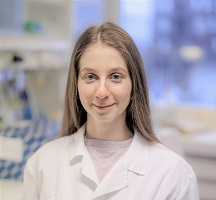The trial lecture is: "The role of DNA damage repair in cancer".
Time and place: May.3, 2022 13:15 PM, Zoom
The events will be live streamed using Zoom. The host of the session will moderate the technicalities while the chair of the defence will moderate the events.
Ex auditorio questions: The chair of the defence will invite the audience to ask ex auditorio questions either written or oral. This can be requested by clicking "Participants" followed by clicking "Raise hand".
The events opens for participation just before they start, and closes for new participants approximately 15 minutes after it has begun.
Main research findings
CRISPR technology has revolutionized both basic research and application-oriented science. This instrument gives us an opportunity to target virtually any desired gene and introduce changes to it. This provides the means to cure diseases that arise from genetic mutations. However, before CRISPR-based therapy can find its way to the patient’s bedside, it still requires some improvements.
Currently, the standard CRISPR Cas9 approach relies on molecular scissors for cutting the DNA, and the reparation of this cut then depends on the internal cellular DNA repair pathways. There are two possible pathways, which can take care of DNA repair. The first pathway (the most common one) simply does the “trimming” and “sealing” of the broken DNA ends. This often leads to disruption of the gene function. Such a pathway has certain therapeutic potential; however, it is limited to the cases where gene function needs to be eliminated. The second, more precise, DNA repair pathway is homology-directed repair. This pathway “renovates” the cut gene based on so-called DNA “repair templates”. Such a template, luckily, can be co-delivered with the DNA scissors inside the cell. This mechanism allows to actually “repairing” the gene sequence to the desired state and therefore - most sought for the therapy-oriented research.
The main goal of my Ph.D. work was to seek the method, which would help to improve CRISPR Cas9 performance and make it more efficient in achieving precise editing. In order to achieve this goal, our group has thought to make use of the naturally existing DNA repair proteins and test, whether they can aid the editing when combined with molecular scissors. We have extensively searched through more than 450 such DNA repair compounds and identified Cas9-POLD3 – a novel fusion that increases the precise editing and makes it faster in comparison to the classic variant. My Ph.D. thesis additionally provides the latest overview of the CRISPR gene-editing field, describes the most pressing problems, and perspective solutions.
Candidate contact information
E-mail: ganna.reint@ncmm.uio.no
Adjudication committee
Professor Frank Buchholz, TU Dresden
Assistant Professor Wei Li, George Washington University
Associate Professor Nikolina Sekulic, University of Oslo
Chair of defence
Professor Odd Stokke Gabrielsen, University of Oslo
Supervisors
Dr. Emma Haapaniemi, NCMM
Assistant Professor Yenan Bryceson, Karolinska Institute
Professor Pål Falnes, University of Oslo
